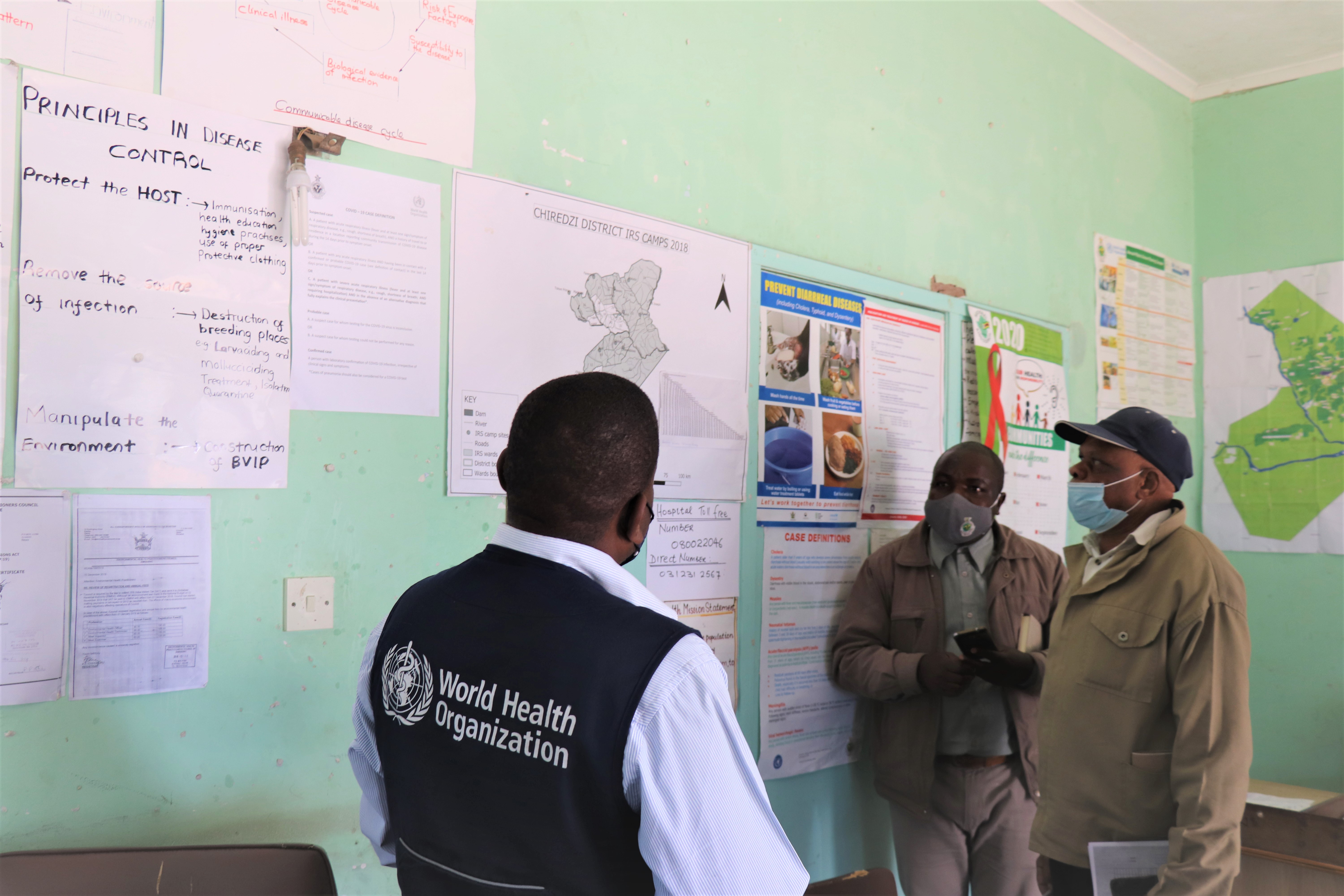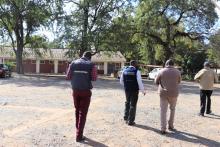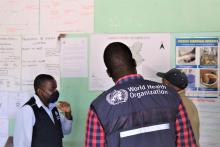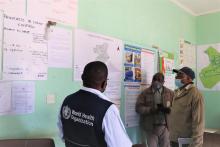Ministry of Health and Child Care (MoHCC) provides on the job support to Masvingo Province COVID-19 Rapid Response Team

By Tatenda Chimbwanda
Masvingo Province, Zimbabwe – Masvingo Province recorded its first case of COVID-19 on 23 May 2020. By 14 July 2020 the number of confirmed cases had risen to 57. Ever since the beginning of the outbreak, the World Health Organisation (WHO) has been backing the Ministry of Health and Childcare (MoHCC) to support Masvingo Provincial Rapid Response Team (RRT) through trainings, mentorship and capacitation to conduct case investigation and contact tracing activities.
MoHCC and WHO have already visited the province twice to support Masvingo Province overall COVID-19 response activities. However, deficiencies in data collection, case investigation and contact tracing continue to exist in the province. Moreover, onward data transmission into the national database using Open Data Kit (ODK) software continues to be weak. In response to the latter, MoHCC with assistance from WHO undertook another visit to Masvingo Province to provide on the job support for these activities, as well as to identify any other areas needing help.
The support visit undertook the form of on-job, practical mentorship by MoHCC and WHO teams to the various RRTs in the District. The following six districts; Masvingo, Gutu, Mwenezi, Chivi, Chiredzi and Bikita were visited between 26 June and 2 July 2020. These districts had COVID-19 cases that had not been fully investigated. MoHCC and WHO met with the various RRTs in the six districts mentioned above, identified the missing data and worked together to complete the case investigation process including completion and submission of detailed Case Investigation Forms (CIF).
They managed to do this for all pending CIFs, except for one case in Chiredzi district, where they could not establish the whereabouts of the case. MoHCC and WHO reinforced the need for timely data transmission, and contact tracing, in order to successfully break the chains of COVID-19 transmission.
Additionally, MoHCC and WHO also joined training activities that were ongoing within the six districts. For example, MoHCC and WHO supported Masvingo District RRT training on COVID-19 response for nurses and Environmental Health Technicians (EHTs) at Nyajena Rural Hospital. The training covered several areas including surveillance, case management, Infection Prevention and Control (IPC), logistics, laboratory, co-ordination and practical session on donning and doffing of Personal Protective Equipment (PPE).
Where necessary, MoHCC and WHO visited the facilities or even the homes of the identified cases. For instance, MoHCC and WHO followed up one case that was sent for self-isolation from Masvingo Teachers’ College. The case was a returnee from South Africa in Mwenezi District. They successfully managed to complete CIF and CRF, and initiated contact follow-up activities.
“As a general observation we noted that the home was not suitable for self-isolation because it is crowded, and there are seven minors who live there, understanding of COVID-19 is poor and there was nobody with a protective face mask there,” explained Israel Chabata, Expanded Program on Immunisation (EPI) manager from MoHCC HQ during the home visit in Mwenezi.
The major challenge discovered from the visit is that of logistical issues for motorbikes. Motorbikes had inadequate/no fuel and were overdue for comprehensive service. Airtime and data for communication, especially at facility and district level was also a task. Coordination was also an issue, there was no clear harmonisation between provincial structures and district level structures, and more so with facility level structures.
Likewise, there was no clear coordination between Masvingo City Health Department and Masvingo District. Despite the challenges, a number of best practices were also noted during the visit. Mwenezi District conducted a teachers training in preparation for re-opening of schools. Chivi District had a very strong collaboration with community stakeholders making their continuity of essential health services, including outreach programmes successful.
Chivi and Gutu Districts performed well in rapidly responding to all alerts from the community. Key recommendations from the support visit included, urgent provision for the airtime and data for all the districts. There was also need for provincial leadership to find ways of ensuring smooth and efficient inter-district communication.
Another recommendation pointed was provision of relevant Information Education Communication (IEC) material in all the districts where this is lacking. This is to be done as a matter of urgency, especially as schools plan to re-open. Besides, there is need to continue re-enforcing the need for nonstop essential health services, to avert indirect COVID-19 related morbidity and mortality.
Consequently, the main objectives of the supportive visit were to identify all cases in the province not yet investigated. The visit was also aimed at completing all pending case investigations, and transmit data on the ODK platform with the district RRT teams. It was also meant to ascertain the status of contact tracing activities in the province and offer relevant support for conducting these activities.
Another reason was to assess the continuity of essential services within the various districts in the province and finally identify any other relevant activities to support COVID-19 response activities within the province at community level.
MoHCC and WHO officials concluded the support visit by noting: “This was a successful mission. We managed to fill in most of the data gaps, and to assess and support the need for continuity of essential health services. Such missions may need to continue being undertaken regularly to optimise outcomes.”
WHO’s overall support to Masvingo Province’s Covid-19 RRT was backed by United Kingdom's Department for International Development (DfID)/ UKAid generous funding.
Communications Officer
Tel: + 263 914 31408
Email: juliasw [at] who.int (juliasw[at]who[dot]int)





